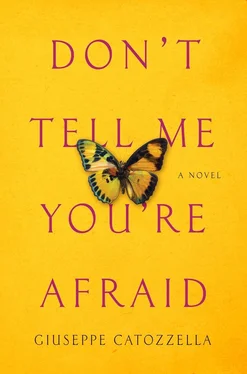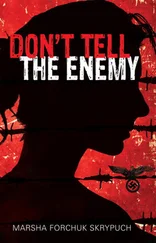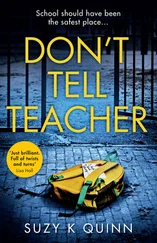And in fact, during the two months before the race in Djibouti, I ran to the point of collapse.
Each time I trained I heard in my head the words that Aabe had told me the morning of my first big race: You’re a little warrior running for freedom, whose efforts alone will redeem an entire people.
Those words pushed me to the extreme.
I trained in the courtyard with the weights; then at night I would sneak away to the CONS stadium, covered by the burka, and practice starts, sprints, lunges, reps. I felt invincible. Every day I would go on like that, six, seven, eight hours straight.
Until I collapsed on the ground, exhausted. Without Alì to grip my wrists and pull me back up.
So usually I sprawled on the patchy grass of the soccer field and lay there for minutes at a time, gazing at the sky.
I liked to picture myself from up above, from where Aabe was looking down on me, like a point in the center of a huge rectangle.
There was only the grass prickling my back, the cool, fresh evening air, the sky full of stars, my heavy breathing, and myself.
After a while everything became silent, my body began to unwind, my legs and back relaxed, my breath settled down.
Then I would take a deep breath and hold it for a while; I’d discovered that the effort kept the tears from coming. I stayed like that for as long as I could, my cheeks puffed out like a carp, so filled with air they nearly burst.
Until it was time to come back to earth, to get up and put on that horrible black garment that covered me from head to toe.
And return home, slowly, breathing through my nose and trying to keep my head empty of any thoughts.
May a thousand pounds of putrid shit fall on your heads and bury you forever.

ONE DAY WHEN I came home from school, there was a man talking with Hooyo in the courtyard who claimed to be from the Olympic Committee. Somewhat balding, with broad shoulders that spoke of a lean, athletic physique.
He was wearing a suit and tie, which immediately made me mistrustful, because only bridegrooms, politicians, and businessmen dressed that way. But then he told me that he knew about my win in Hargeysa and that Abdi Bile himself, the great champion from the eighties, would be glad to meet me.
“Okay, but when?” I asked.
“Right away, if you’d like,” he replied calmly as he adjusted his tie. “By the way, I haven’t yet introduced myself. I am Xassan. Xassan Abdullahi.”
I looked at Hooyo and Hodan, who nodded yes without speaking. I could go if I wanted to. Hodan, however, would come with me.
“We’re only too pleased to have your sister come as well,” the man said in his equable way. “Let’s go. I have the car parked down the street.” He seemed like a British gentleman or like someone who had traveled a lot in his youth or had lived abroad a great deal.
Hodan and I looked at each other. For the first time in our lives we would ride in a car!
We left the courtyard and the man led us to the car. It was a red Honda sedan. He opened the back door and we got in. It was very cold inside, because of the air-conditioning. It felt like being surrounded by ice. Then too the black leather seats made a crackling noise every time we moved. Seen through the windows of the car, the city looked different, both smaller and more impoverished. The people along the streets whom I had seen a million times seemed even more like good-for-nothing idlers.
We arrived in twenty minutes or so. It was the first time I had set foot in the headquarters of the National Olympic Committee.
Inside there were men and boys, some wearing the tracksuit of Somalia’s national team, others dressed stylishly like Xassan. He went into a room, politely telling us to wait for him outside. On the walls were lots of photographs of athletes. Hodan and I kept looking around, feeling ill at ease.
As we lingered in the hall, a young man wearing Somalia’s blue tracksuit came up and showed us to a place where we could sit down. It was a small room with more photographs. After a while, another man appeared at the door: white hair, jacket and tie, and a pleasant face. Hodan and I were as awkward as two little girls on the first day of school.
“Let’s go to my office,” he said with a big smile, motioning us out.
We entered the office and were seated in two black leather chairs in front of his desk. A nameplate on the door read DR. DURAN FARAH, VICE PRESIDENT. Along the walls, shelves held numerous trophies. He took a box of chocolates out of a drawer and offered them to us. I’m not a sweets lover, except for sesame paste, but Hodan is, and she took two. After asking us how we were and exchanging a few words with me, he said they knew that I’d won an important race and they thought they could try to make me into a real athlete.
“But I’m already a real athlete,” I replied, digging my heels in under the chair.
“Let’s say you’re on your way to becoming one.” He smiled.
“But I won the race in Hargeysa. I’m the fastest woman in the country,” I insisted. I would have punched him there on the spot if he’d continued questioning my ability.
The man looked at me with his head slightly tilted; then he again displayed his white teeth in a smile. “Among the amateurs, Samia. For now, only among the amateurs.”
It was the first time he’d said my name, and I liked the way he pronounced it, with a drawn-out a . “Saaamìa,” just as Aabe used to say it. I drove the thought of my father out of my head. “Do you want to become a professional?” he asked then, breaking through the drift of my memories.
I didn’t answer right away because I couldn’t believe my ears.
“Do you want to become a part of our Olympic team?” Duran repeated in that gentle voice of his.
At that point he could just as well have asked me to jump off a mountain or swim up the Shabelle River and I would have done so without a second’s hesitation.
Six weeks later I was back on a bus. Only this time I hadn’t had to help Hooyo for months to pay for my ticket.
A bus to Djibouti.
With me was Xassan.
Overhead, a Somalia duffel bag.
On me, a blue Somalia tracksuit.
It was all so perfect that every morning since meeting Xassan, I had gone to Hooyo and asked her to pinch my cheek to make sure it wasn’t a dream.
It prompted the first smile of the day from her, those mornings when her eyes were still swollen from crying all night, thinking about Aabe.
On that bus I felt like Florence Griffith Joyner, the fastest woman of all time, the perfect athlete, whose name had been engraved in my memory the first time I’d heard it on the radio at Taageere’s: Poor man, I always made him tune in to the sports station.
I was wearing the color of my country, the blue of the sky and sea, and I felt like the strongest sprinter in the world. I would so much have liked Aabe to be with me. Sometimes I thought that even Alì would have been enough, if I couldn’t have Aabe back. From their eyes I would have been sure that everything that was happening to me was real. Papa would have whispered gently: “I told you, my little warrior.” And that would have eliminated any doubt. Then he would have kissed me on the head, though I would have had to be the one to bend down, since I was taller now; I could no longer sit on his lap. And he would have said simply: “Go. Go and win.”
The two drivers spelled each other several times, and I slept almost the entire way. There was Xassan to watch over me.
After a twenty-eight-hour trip, we arrived in Djibouti.
We would rest up the night before the race in order to be in top form. Sleeping in a hotel was one of those things — like riding in a car, traveling by bus, wearing the Somalia uniform — that had always seemed impossible to me. Yet it was all real. The light of my good fortune had been lit somewhere. Maybe it was Aabe who turned it on, in a secret place known only to him.
Читать дальше





![Ally Carter - [Gallagher Girls 01] I'd Tell You I Love You But Then I'd Have to Kill You](/books/262179/ally-carter-gallagher-girls-01-i-d-tell-you-i-lo-thumb.webp)







